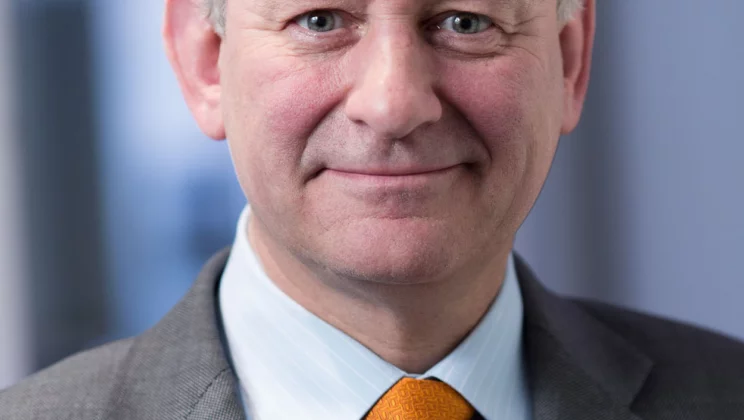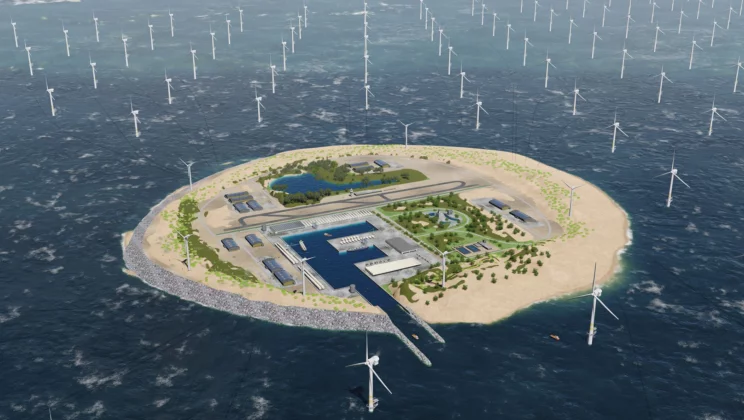In 2016, the North Sea countries and the European Commission resolved to step up their commitment to unlocking the potentials of the North Sea. The so-called North Sea Energy Cooperation is promising, and the time has now come to realise its potentials, assert two ambassadors. “Esbjerg is a major hub, and shipping operations out of the Port of Esbjerg to the large-scale wind farms create value throughout Europe," says the German Ambassador to Denmark.
A tenfold increase in offshore wind capacity in the North Sea by 2030. This was how the European Commission rated the potentials when it met with Denmark, Germany, Norway, Sweden, Belgium, the Netherlands and the United Kingdom on 6 June 2016 to sign the declaration on an all-new North Sea regional alliance.
However, this will be accomplished only if the States jointly succeed in extending the power grid in the North Sea and establishing an internal energy market. With the North Sea Energy Cooperation, the course was charted, and 2017 saw the advent of further events and projects to give impetus to the joint mission.
Firstly, 2,105 MW of new capacity was installed in the North Sea. Danish EnergiNet.dk and Dutch TenneT started laying Cobracable from Endrup, south of Esbjerg, to the Port of Eemshaven on the Dutch north coast. Next, the decision was made to establish VikingLink, Europe’s longest power interconnector to date, between Denmark and the UK.
For the Dutch Ambassador to Denmark, Henk Swarttouw, this development is both promising and necessary:
”In both the Netherlands and across the EU, achievement of our objectives is contingent on developments in renewables. By 2050, the target is for the Netherlands to have 40-70 GW of our electricity generated from wind energy. Consequently, we have to pursue intensive growth in the development of wind energy in the coming years in the entire North Sea region, and not least along the Dutch coast,” he explains, adding:
“I am in no doubt that the North Sea will be crucial for our energy supply in the years to come.”

Henk Swarttouw, Dutch ambassador to Denmark.
Germany escalating North Sea developments
In Germany too, developments in the North Sea are a major focus for future energy supply. According to the German Ambassador to Denmark, Andreas Meitzner, the target of ensuring that 65% of German electricity consumption is covered by renewables by 2030 is explicitly incorporated in the new German government’s draft coalition agreement:
“In that context, the North Sea plays a crucial role. In 2017 already, around 15 per cent of Germany’s wind energy was harvested from the North Sea, and while this is a good result, all things being equal, there is still huge expansion potential,” he explains.
He was therefore also pleased to see developments in offshore wind power in the North Sea scale new heights in 2017.
“Developments in the North Sea over the last year have been very positive. Not only because the capacity is increasing, and the technology is improving, but also because costs have come down significantly,” he says, while also highlighting the Port of Esbjerg’s role as a hub for development:
“The Port of Esbjerg has played a pivotal role in recent decades in the development of the offshore wind sector Europe-wide, and especially as regards German projects in the North Sea. For the German wind farms, the Port of Esbjerg is crucial as a hub for shipping out both turbines and equipment. The shipping operations out of the Port of Esbjerg to the large-scale wind farms create value throughout Europe.”

Andreas Meitzner, German ambassador to Denmark. © Photo HASSE FERROLD
Focus on more interconnectors
The two ambassadors agree that new wind farms will not be enough in themselves if the countries are to realise their ambition for an internal energy market. This will also require a increase in transnational electricity links.
“We are going to have to extend the existing grid system and establish new interconnectors between the countries. This will serve to stabilise energy supply across the whole of continental Europe and mean lower production costs,” says Andreas Meitzner. When the electricity cannot be stored, it can then instead be redirected to those locations that need it.
According to the Dutch Ambassador, Henk Swarttouw, the benefits of the interconnectors are also plain to see:
“Both onshore and offshore investments in electricity interconnectors hold a host of benefits. Firstly, they have a positive effect on electricity prices, while they are also conducive to improved reliability of supply and wind farm efficiency. All three factors have spurred Dutch TenneT and Denmark’s Energinet.dk to start laying Cobracable,” he says.
North Sea Wind Power Hub charts the course
One of the more remarkable projects, which took off in earnest in 2017, is the vision for an ‘energy island’ known as the North Sea Wind Power Hub project. In the previous year, Energinet.dk in Denmark together with TenneT in the Netherlands and Germany formed a consortium to explore the scope for realising this project.
The aim is to establish a manmade island and collection point for wind energy in the North Sea with links to several of the surrounding countries. Energinet.dk estimates that North Sea Power Hub could potentially supply 80-100 million Europeans with renewable energy Europe-wide.
Henk Swarttouw expresses great enthusiasm for the project and the potentials, which he believes are visionary:
“This project holds huge potential for both the Netherlands and the EU, but with it being an ambitious project it will take time to establish. However, it is promising that the consortium was formed in 2017 and that work has got underway. For example, in developing the technology needed to ensure that the project is feasible in the first place,” says Henk Swarttouw with reference to the scope for converting the electricity generated by the farms into other energy sources such as gas.
This specific prospect was one of the reasons that led the Dutch gas company Gasunie to join the consortium in autumn 2017.
Germany too is keeping a close eye on this project, says Andreas Meitzner, although the German government has not yet reached a decision on the project as regards its own national strategy in this area:
“We are currently witnessing a number of promising development projects in the North Sea, and the German government is following developments with both interest and openness,” he says.

In 2017, Energinet.dk and TenneT began working on a North Sea Wind Power Hub. The project is still in the initial stages, and no decision has yet been made on location or design. This is an illustration of what the energy island might look like. Prepared by TenneT.
Cooperation on several fronts
Both ambassadors agree that the prospects for the North Sea Energy Cooperation in 2018 are promising. Equally, they point out that the strengthened cooperation to enhance utilisation of resources in the North Sea will be increasingly crucial in the years ahead. At least if the aim is to escalate development:
“The German government has great confidence in the North Sea Energy Cooperation and in the dedicated neighbouring Member States we are now in dialogue with. It is a great advantage that we agree on the priorities for long-term enlargement so that we can pool our efforts on cross-border infrastructure, the development of new cross-border wind farms, and not least on knowledge sharing,” says Andreas Meitzner.
Henk Swarttouw agrees, and also highlights the joint obligation of these nations to ensure that environmental protection is assured every step of the way:
“We have a joint undertaking across the region when it comes to conservation of North Sea ecosystems. On that front we have an obligation to cooperate in order to ensure that our ambitions for the energy sector are not realised at the expense of the North Sea,” he says.
Go to overview

